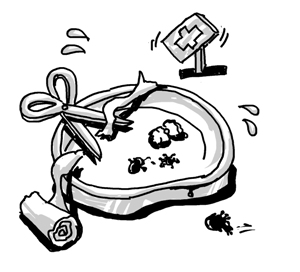Hospitals should be city's priority

Illustration: Lu Ting/GT
I recently experienced firsthand the Chinese health care system after a nasty cut on my arm left me needing stitches. Most people's worst nightmare when abroad is illness or injury; from food poisoning to broken bones, a medical emergency seems worse when you're thousands of miles from home.
I had lacerated my right arm on a rusty metal fence, and the cut was so deep, you could see the layer of fat under my skin. I made my way to the Shanghai Ninth People's Hospital, affiliated with Shanghai Jiao Tong University School of Medicine.
Upon arriving at the hospital, I was struck by the number of people lying on gurneys in the reception area, the hall way, the corridors and throughout the hospital. China's population problem was all the more evident from the overcrowding in the hospital. Before I could be seen, I first had to pay to register. While in some countries in the West this is commonplace, I come from England, and the idea of paying for health care was alien to me.
The doctor brought me into a room and told me to sit with my arm on a bed, a bed which had blood on it. When I pointed this out to him, he simply told me to sit at the other end. Alarm bells were going off in my head, and as he cleaned my wound with a razorblade, wearing gloves for only half the time, a stream of people with injuries trooped in and out of the room.
After getting six stitches put into my arm, it was time for me to get injections and antibiotics to prevent further infection. After paying yet more money, I then had to locate the correct room. After about 20 minutes of wandering around, I finally found the right place. I was appalled by the state of the room, in which the disposal bins and containers were absolutely filthy. The words "hygiene" and "hospital" should be synonymous, but a lot was left to be desired.
After receiving yet more injections, I was finally stitched, injected and bandaged, and ready to leave. The hospital had been an overwhelming experience, not only because of my injury, but also the state of the building and the masses of people inside. Navigating the vast hospital was a mammoth task, and one I was only able to do because I had somebody who could speak Chinese with me. If it had not been for my friend, I would probably still be there.
While there was one sign in English, it merely translated which departments they had in the building. Directions and the name of individual rooms were all in Chinese. Very little English was spoken at the hospital, which struck me as odd when Shanghai is such a bustling international metropolis, with a large expat population and hordes of tourists. Of course, the hospital is not a tourist attraction, and not somewhere anyone would go by choice. It seems that Shanghai has overlooked some of the city's crucial amenities in favour of upgrading tourist spots and infrastructure, like the metro, that see heavy traffic, at the expense of life or death essentials.